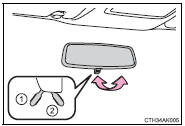Toyota Corolla (E170) 2014–2019 Owners Manual / Operation of each component / Adjusting the seats / Inside rear view mirror / Anti-glare function
Toyota Corolla (E170): Anti-glare function
► Manual anti-glare inside rear view mirror
Reflected light from the headlights of vehicles behind can be reduced by operating the lever.
1 Normal position
2 Anti-glare position

► Auto anti-glare inside rear view mirror
Responding to the level of brightness of the headlights of vehicles behind, the reflected light is automatically reduced.
Changing automatic anti-glare function mode
On/off
When the automatic anti-glare function is in ON mode, the indicator illuminates.
Vehicles without a smart key system: The function will set to ON mode each time the engine switch is turned to the “ON” position.
Pressing the button turns the function to OFF mode. (The indicator also turns off.) Vehicles with a smart key system: The function will set to ON mode each time the engine switch is turned to IGNITION ON mode.
Pressing the button turns the function to OFF mode. (The indicator also turns off.)

■To prevent sensor error (vehicles with an auto anti-glare inside rear view mirror)
To ensure that the sensors operate properly, do not touch or cover them.

CAUTION
Do not adjust the position of the mirror while driving.
Doing so may lead to mishandling of the vehicle and cause an accident, resulting in death or serious injury.
Other materials:
Customer problem analysis
Hint:
in troubleshooting, the problem symptoms must be confirmed
accurately, meaning that all preconceptions
must be set aside in order to make an accurate judgement. To ascertain what
the problem symptoms
are, it is extremely important to ask the customer about the problem and
cond ...
If your vehicle overheats
The following may indicate
that your vehicle is overheating.
The engine coolant temperature
gauge is in the red zone or a loss
of engine power is experienced.
(For example, the
vehicle speed does not
increase.)
"Engine Coolant Temp High
Stop in a Safe Place See
Owner's Manual" is shown
on ...
How to proceed with troubleshooting
1 Vehicle brought to workshop
2 Customer problem analysis
3 Check and clear dtcs and freeze frame data
4 Problem symptom confirmation
Symptom does not occur: go to
step 5
Symptom occurs: go to step 6
5 Symptom simulation
6 Dtc check
There is no
output: go to step 7
There is outp ...


